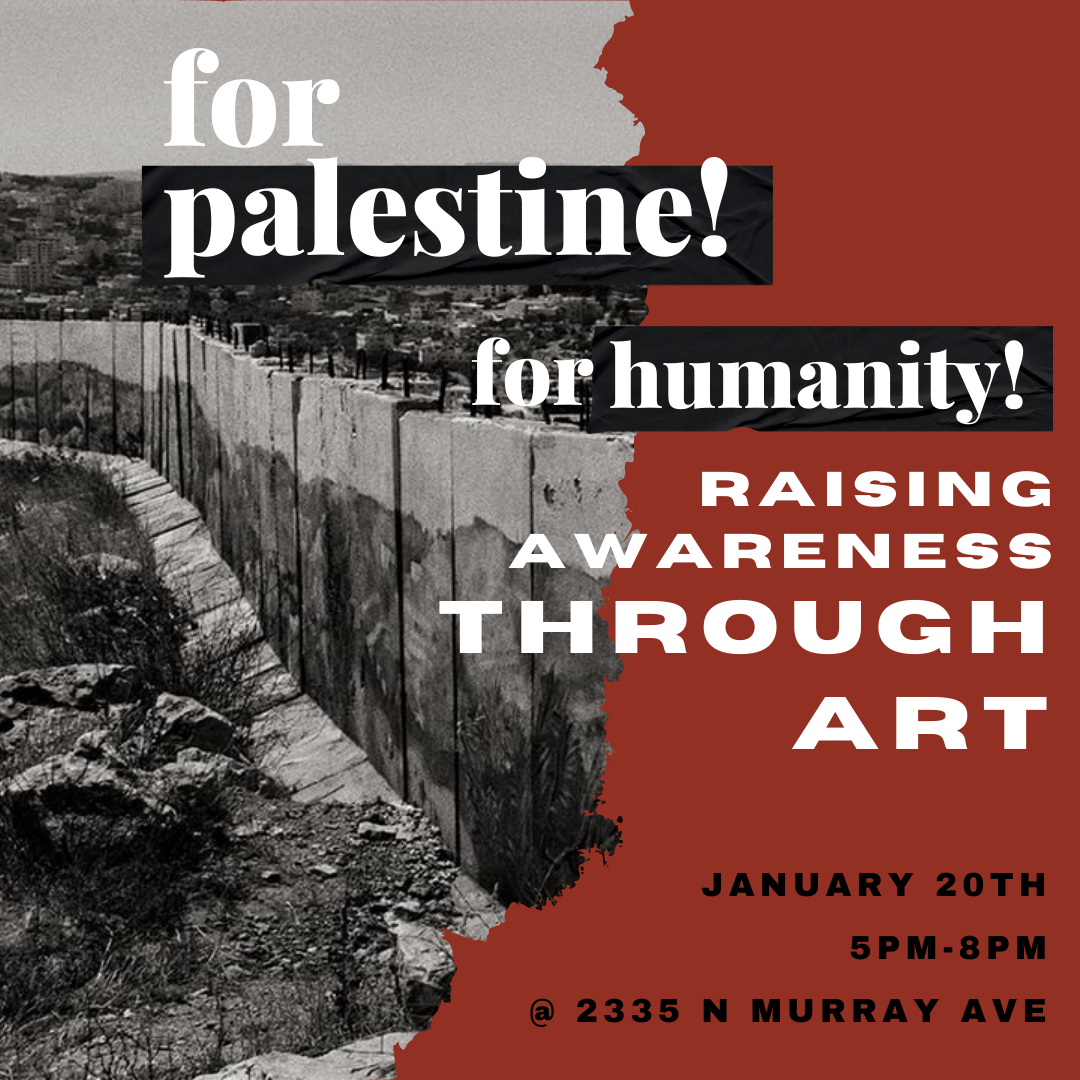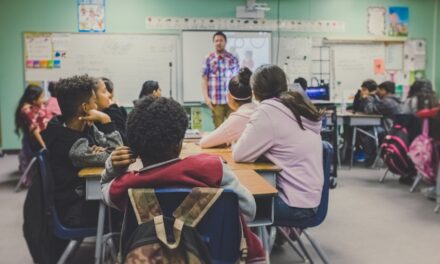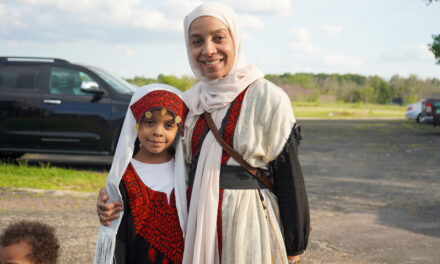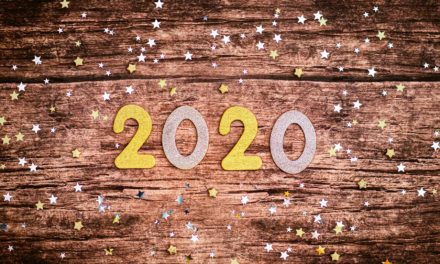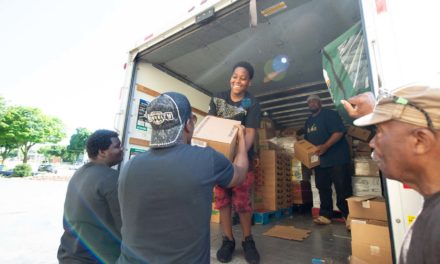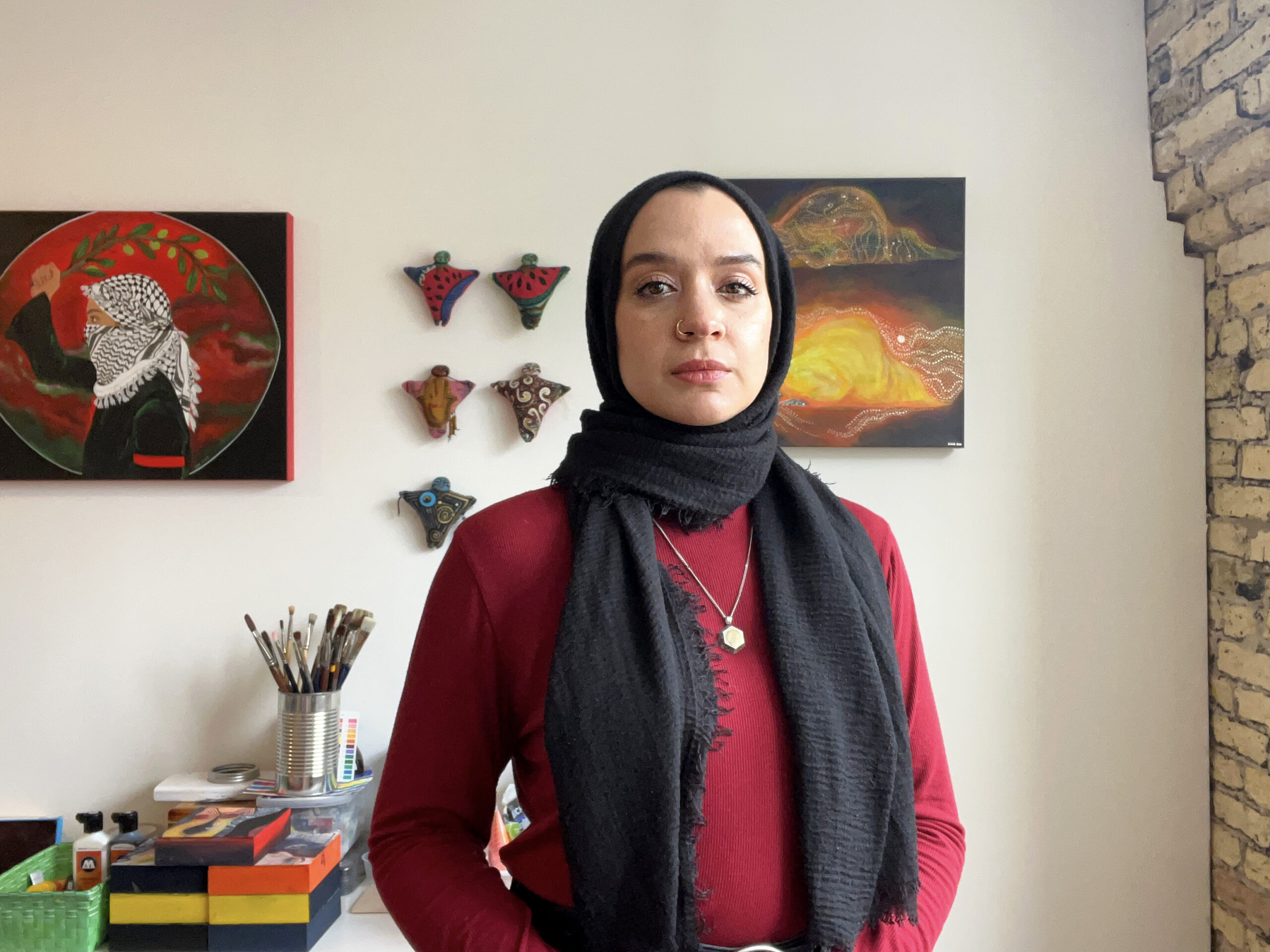
Milwaukee multidisiplinary artist Liala Amin had the idea to put on an art showcase to raise awareness about Gaza.
Artist Amal Azzam, co-founder of Fanana Banana art collective in Milwaukee, received an Instagram message in early December from her friend and fellow Milwaukee artist Liala Amin.
“Are y’all having a show for Palestine?” Amin asked.
An open call to artists of all levels and in all media continues through tomorrow, Jan. 17, for a
showcase about Palestine, Gaza, anti-imperialism and anti-colonialism. Free submission; 100% of art
sale proceeds go to Gaza. (Click on image for link to the artist submission form).
“I feel so incredibly disturbed by what we are witnessing,” Amin told the Wisconsin Muslim Journal in an interview last week. “We’re seeing a genocide play out through smartphone screens. Why is this still going on? How many more dead children do we have to see?”
Jan. 14 marked 100 days of Israel’s military assault on Gaza. About 24,000 people in Gaza have been killed since Oct. 7 in retaliation for a surprise attack by the armed wing of Hamas and other Palestinian groups that killed about 1,200 people. Israeli military has been bombing Gaza, where about 2.3 million Palestinians are trapped in the small strip of land that Israel has held under siege since 2007.
“Israel’s military is killing Palestinians at an average rate of 250 people a day, which exceeds the daily death toll of any other major conflict of recent years,” reports Oxfam, a human rights organization. “The scale and atrocities that Israel is visiting upon Gaza are truly shocking,” the report quotes Oxfam’s Middle East Director Sally Abi Khalil. “Nowhere is safe and the entire population is at risk of famine. It is unimaginable that the international community is watching the deadliest rate of conflict of the 21st century unfold, while continuously blocking calls for a ceasefire.”
Azzam shared her lifelong acquaintance’s feelings about Gaza. “Since October, I have been deep into watching the news every single day,” she told WMJ last week. Azzam is a Palestinian American who traces her roots back to refugees of the Nakba, the 1948 expulsion by Zionists of Palestinians from Palestine.
“We should do something but Fanana Banana has a lot going on and I can’t do it alone,” Azzam told Amin. Amin was eager to help.
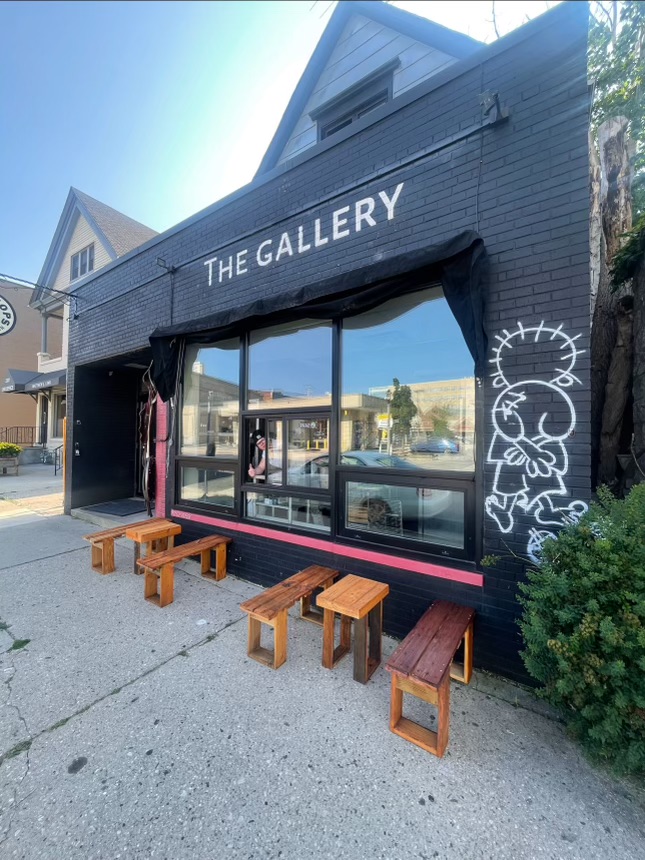
The Gallery, 2335 N. Murray Ave., is a Palestinian American-owned restaurant and art gallery.
Together they planned an art exhibition to raise awareness about Palestine among people in Milwaukee who may not know the history behind the headlines and to raise money to help the people of Gaza. They posted an open call to artists that continues through tomorrow, Jan. 17, (fill form for submissions here). Artists in all media are invited, including visual and performance art, spoken word poetry and others. All levels of artists are invited. There is no fee to submit work; all artists are asked to donate all proceeds from art sales to Gaza.
Submissions are rolling in. Well-known local artists David Najib and Rida Fatima have contributed work.
Azzam found a venue and Amin began organizing the submissions. They began spreading the word, hoping to draw a diverse audience.
For Palestine! For humanity! Raising Awareness through Art will be held Saturday, Jan. 20, from 5 – 8 p.m. at The Gallery, an art gallery and restaurant at 2335 N. Murray Ave., Milwaukee. Admission is free. All proceeds from the sale of artwork go to humanitarian aid in Gaza.

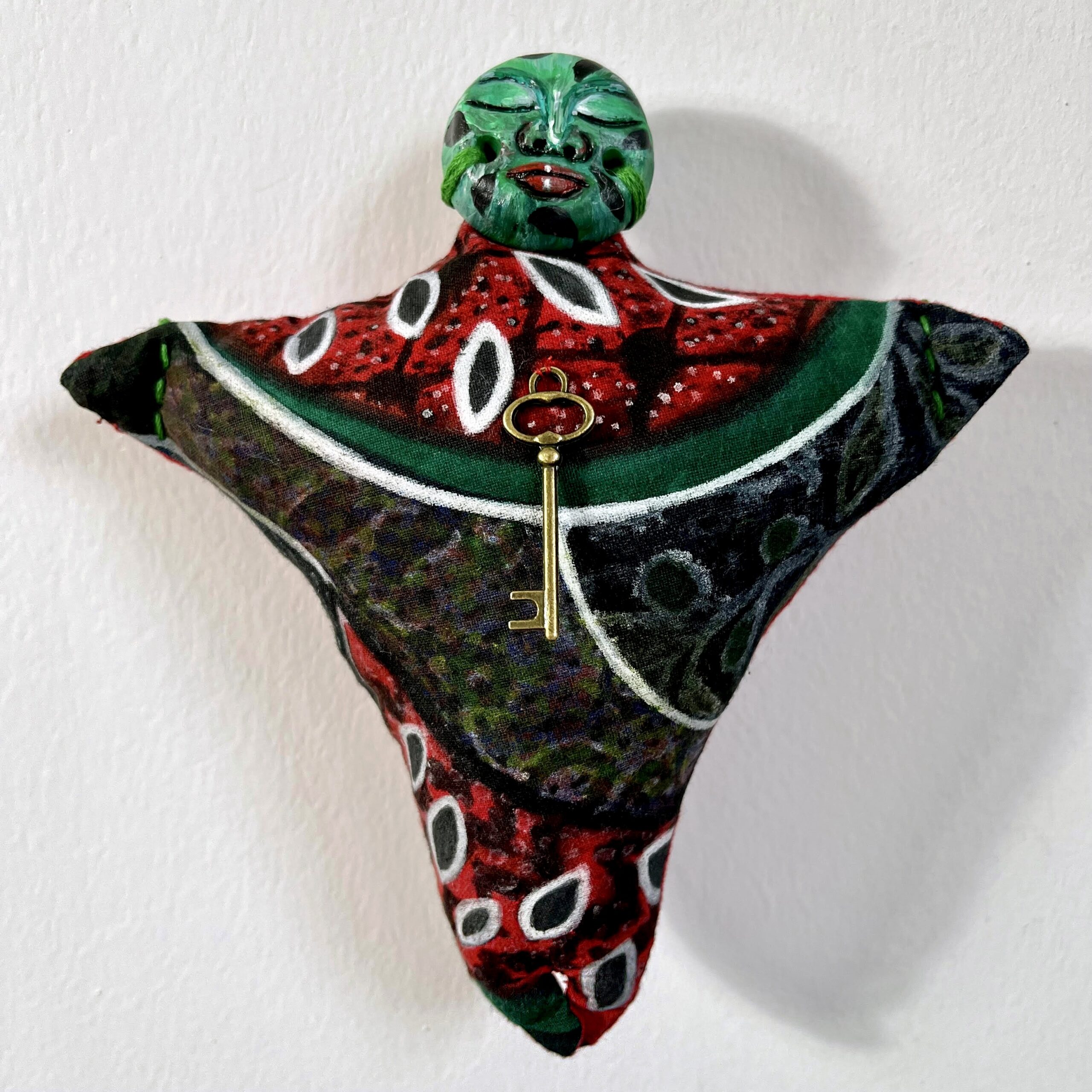
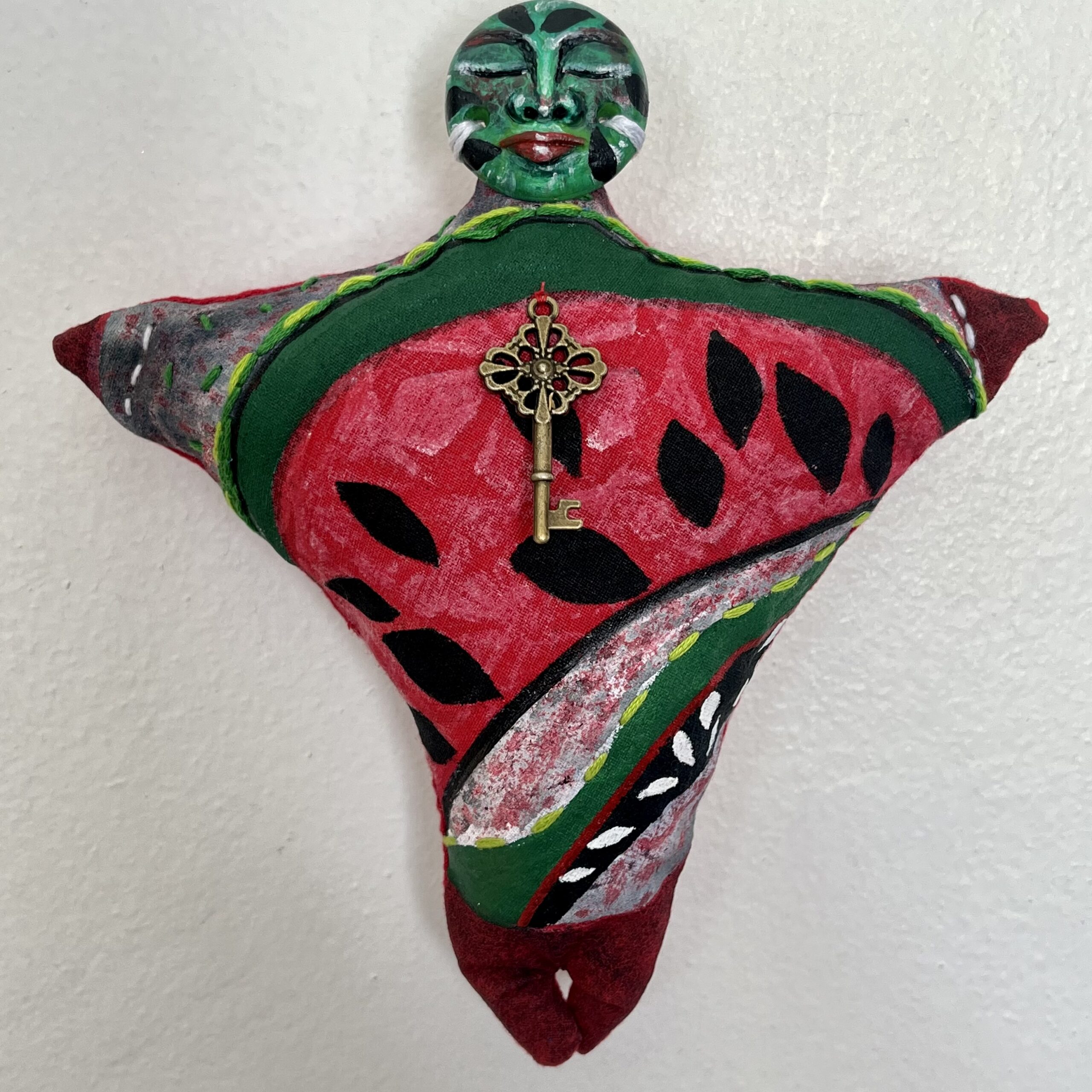
Three handstitched talisman dolls by artist Liala Amin are made from a watermelon print, a symbol
of Palestine.
“We’re both directly affected.”
Amin specifically reached out to Azzam to plan a show that would raise awareness about Palestine because “both of us have been directly affected by what’s going on,” she said. “The gravity of it causes me to ask, What more can I do? What skills can I utilize to do something?
“I’m only 34 and I can remember seeing aggressions from Israel on Palestine over the past two decades, but I’ve never witnessed anything like this in my life,” Amin said. “I never thought I would.”
As artists, both she and Azzam can educate, she thought. “Awareness is a big component of educating people on what has been happening. This did not start on Oct. 7 but you can’t just go up to someone and say that. We can use art to tell that story.”
Amin is not Palestinian. “I’m not even 100% Arab. My mom is white. She’s a convert to Islam. But my dad is Lebanese, specifically South Lebanese. I have held onto that part of my heritage very strongly.”
She learned Israel had occupied south Lebanon from 1985 for more than a decade and today there are tensions at the border. “I know right now the safety of my family in south Lebanon is compromised. They live close to the border (with Israel) and there’s always a 50/50 chance that when you wake up today is going to be the day their village gets bombed.” In 2006, her family home was hit by bombing by the Israeli military, she said.
“I know my family is not experiencing the level of threat of Palestinians in Gaza,” she added. “No one there is safe.”
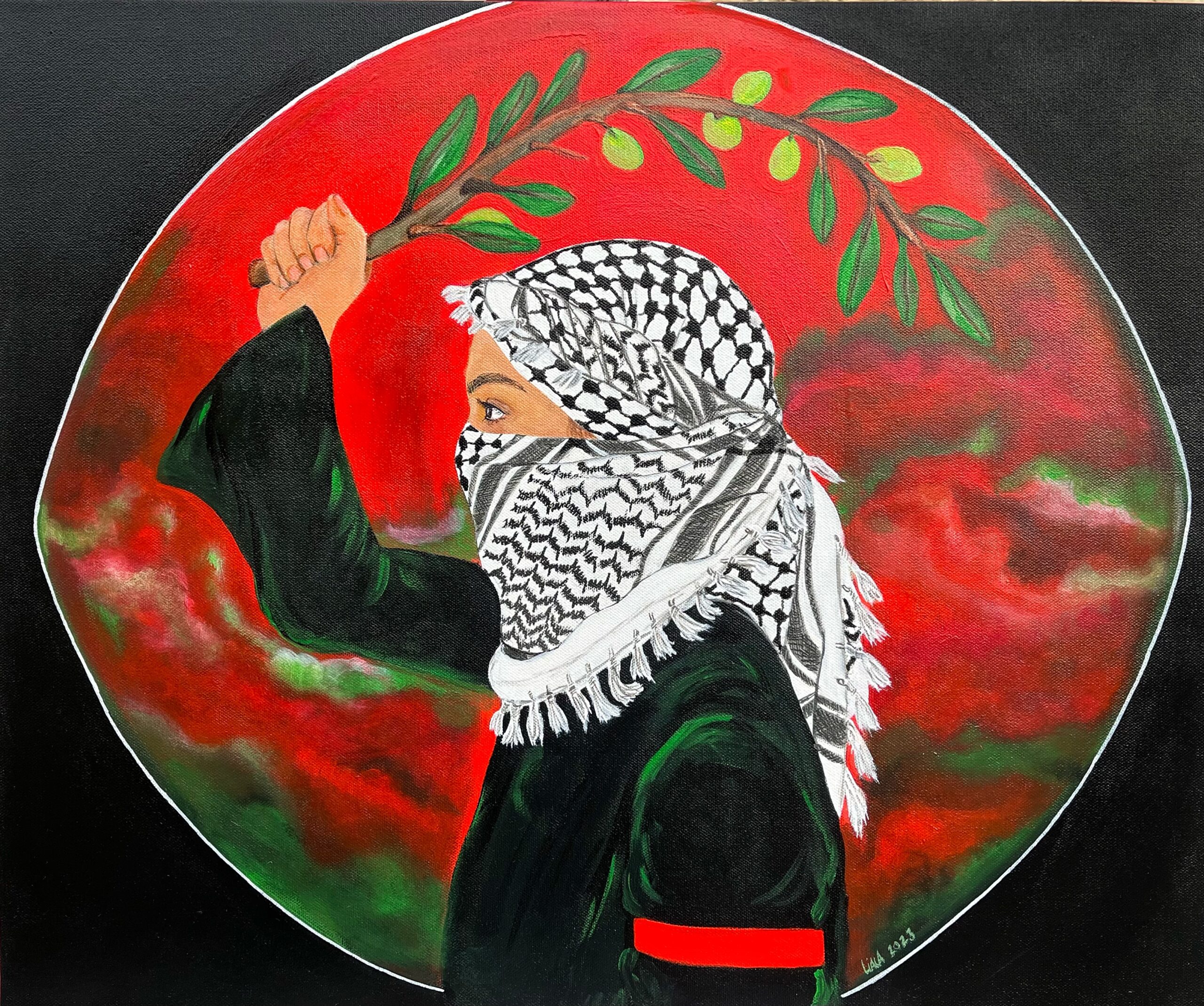
Aaidun (We Will Return) by Liala Amin, co-coordinator of “For Palestine! For humanity! Raising
Awareness through Art,” an art showcase Jan. 20 at The Gallery in Milwaukee.
Amin also experiences the violence in Gaza personally because she is part of Milwaukee’s Muslim, Arab community, she said. “One of my very close friends lost 16 members of her family in an airstrike in Gaza. It’s having that connection to friends whose family members have been killed, of having my own family in the region.”
Yet, you don’t have to be Palestinian or Arab or Muslim to be concerned about Gaza, she said. “If your humanity is intact, this should absolutely emotionally impact you every single day, just as another human being.”
Amin is contributing talisman dolls, some made from watermelon-themed prints, to the show. Watermelon, when sliced, has the red, green, black and white of the Palestine flag. It became a symbol for Palestine after the 1967 war, when Israel banned the flying of the Palestinian flag in the occupied territories. Images of watermelons began appearing on banners and tee-shirts.
“I love artists so much because we always find a way to say what we want to say!” Amin said. “Today it is known as a symbol for solidarity, freedom and fighting against occupation.”
Personal introspection
Azzam’s parents on both sides left Palestine during the Nakba in 1948. They moved north to Palestinian refugee camps in Lebanon where her parents were born.
“My identity and history are very directly linked to the 1948 Nakba. I have two cousins in the south of Gaza right now,” she said. “When we ask them if they’re okay, they always say, ‘Yes.’ There’s this sense of not overbearing people with that information. They just keep saying they’re ok.”
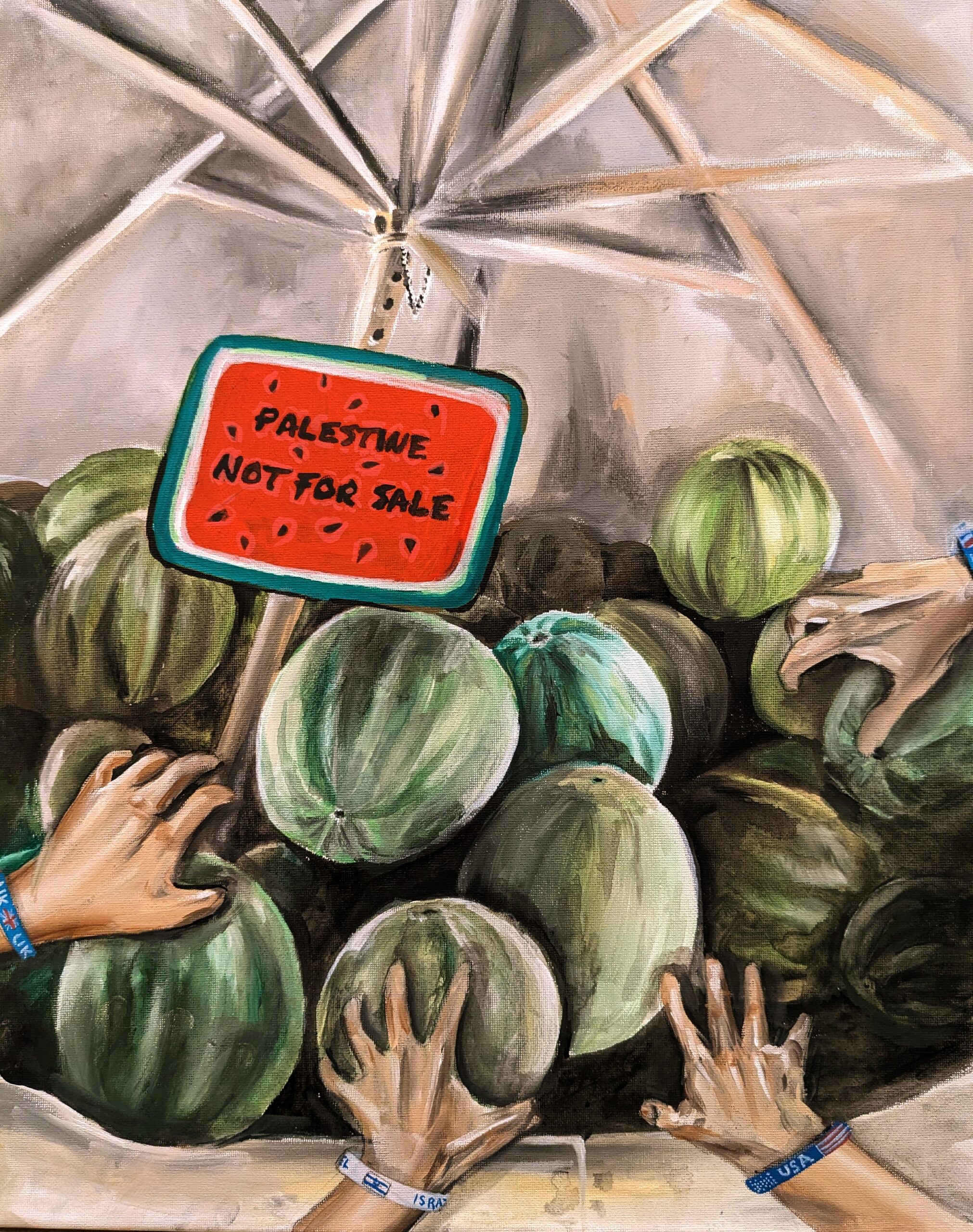
Artwork by Aida El Hajjar
As a child, Azzam visited relatives at the refugee camp in Lebanon. “When we were little, we didn’t realize the difference in their financial/economic situation from ours. We were enjoying the sun, eating grapes off a vine and going to the beach. It never registered that it was a refugee camp. My father never described himself as a refugee or that we would visit a refugee camp. He just said we are going overseas to visit our family there.”
During the COVID-19 pandemic, Azzam took some time to focus on understanding herself, she said. “I started therapy to try to understand why and where all this trauma, like generational trauma, comes from.” First, she had to educate her therapist on what it means to be a Palestinian, she said.
She also had started working at Hanan Refugee Relief, a refugee resettlement agency. “While working with and seeing refugees when they first come into the States, their body language, how they talk and how they act, how everything’s so overwhelming and they have to do so much in such a short amount of time (90 days are not enough time for someone to truly understand how a whole new system works, but that’s what they have per the government)—I was experiencing that and it finally connected. I understood my parents a lot more by seeing what they had to go through.
“How my mom had to learn to drive, learn a new language and all these new things while away from her family, not knowing if she would ever see them again, which is what every refugee experiences.
“I started to better understand all the experiences I had lived through, too,” she said. “Why my immigrant father is so strict and why he has such extremely high expectations. Immigrant parents are here to ‘make it,’ not to dilly dally.”
Azzam also worked with a nonpartisan political, nonprofit organization that was black- and brown-led, “also having a dual identity. They taught me a lot about the power of words and how important it is to know certain words. With words, it’s not just a blob of feelings. If you know a word you can look it up. You can find books. You can seek information.
“I was finally able to understand I am a daughter of refugee immigrants who were born in refugee camps, who did not have citizenship anywhere at the time. I learned what it means to be a first-generation American, the struggles and challenges that come with that. It gave me a lot of relief to read those words and know what I’m going through.”
Today, while watching the news about Gaza, Azzam hears it being called “the second Nakba.” It has her wondering, “What did my grandparents really go through? That I’ll never know.”
All of that reflection convinced Azzam of the importance of representation, she said. As a Palestinian American, she has often had to explain where her family is from. “You know Palestine?” she’ll ask to blank looks.
“Israel?” They nod. It’s a terrible thing to have to identify with the occupiers for people to know where you’re from, Azzam said.
“Hopefully, when folks attend the show and see the artwork on the walls, they will feel a bit of relief to feel they are being seen.”
“I want this to be a supportive environment for everyone, where we can find allies in different people and have conversations,” Amin explained. “Building community is incredibly important right now. It’s very easy to have empathy burnout, and you need to surround yourself with people who will rejuvenate you.”
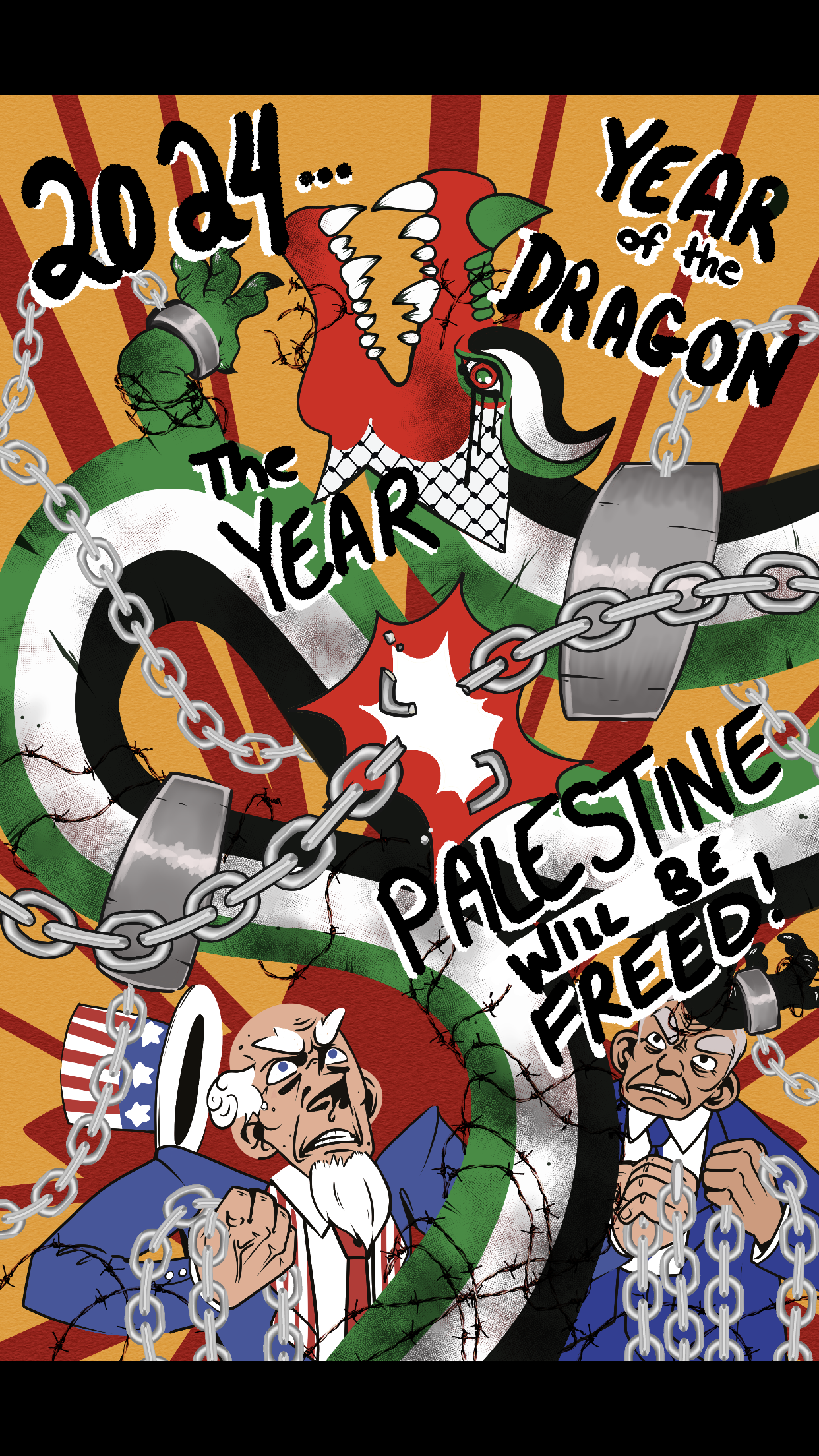
Artwork by Hayden Harwood
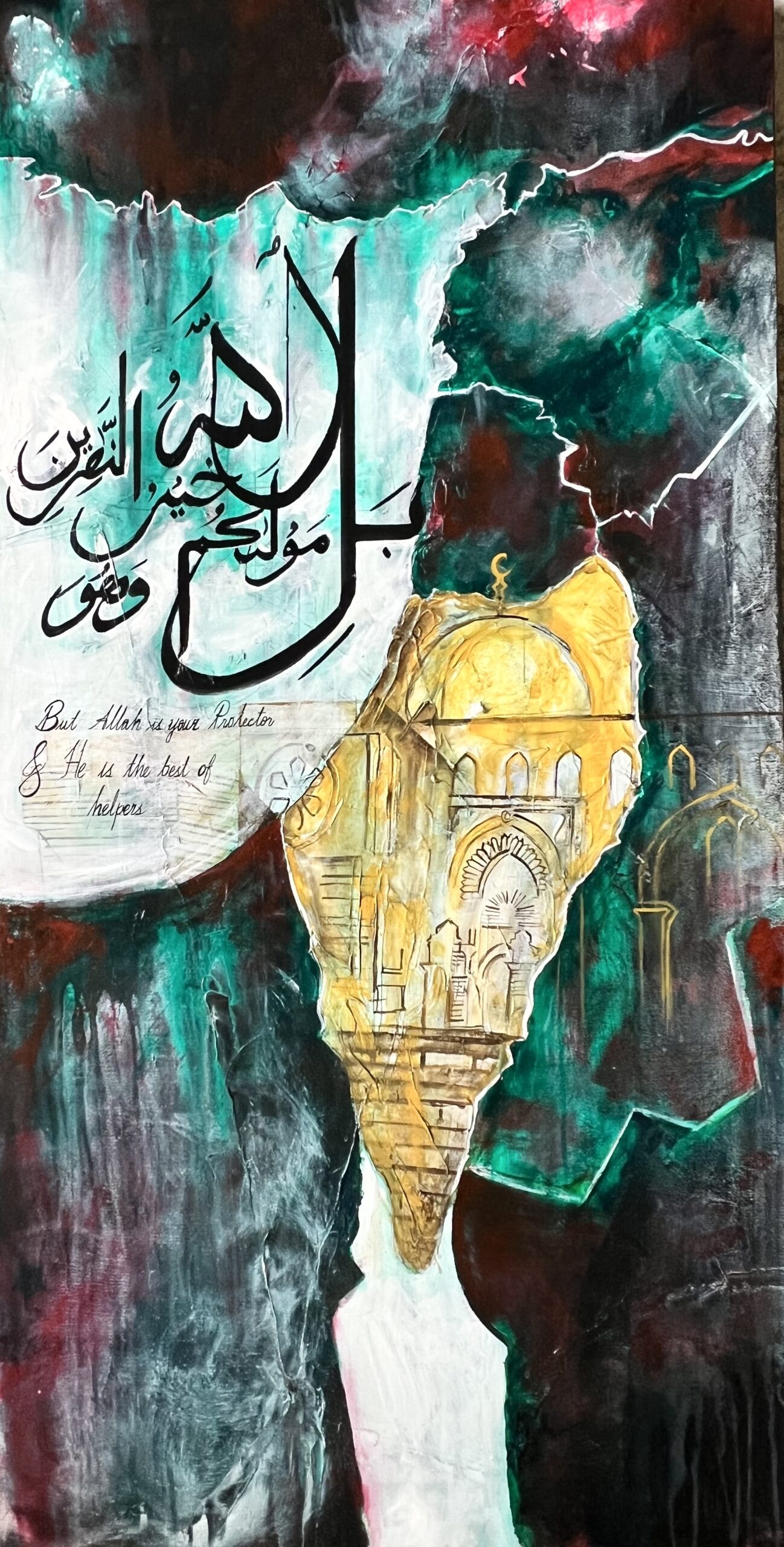
Calligraphic painting by Rida Fatima
Bringing awareness and aid
Amin and Azzam said they are hopeful people who aren’t Palestinian or have Palestinian friends will come to the art show.
“I feel cautiously optimistic because, for the first time, there is a large global response to the crisis in Palestine,” Amin said. “A lot of groups are showing up at rallies and protests. That gives me hope that if we can keep up the momentum, something positive can come out of it.”
Amin and Azzam expected finding a venue to be a challenge. “I have had a studio practice in Milwaukee for the past four and a half years, been in shows and gotten to know people. But there is something about this particular time when I’ve felt so let down by everyone I know. Gallery owners and artists who usually speak up for human rights have been completely silent now about what is happening in Gaza.”
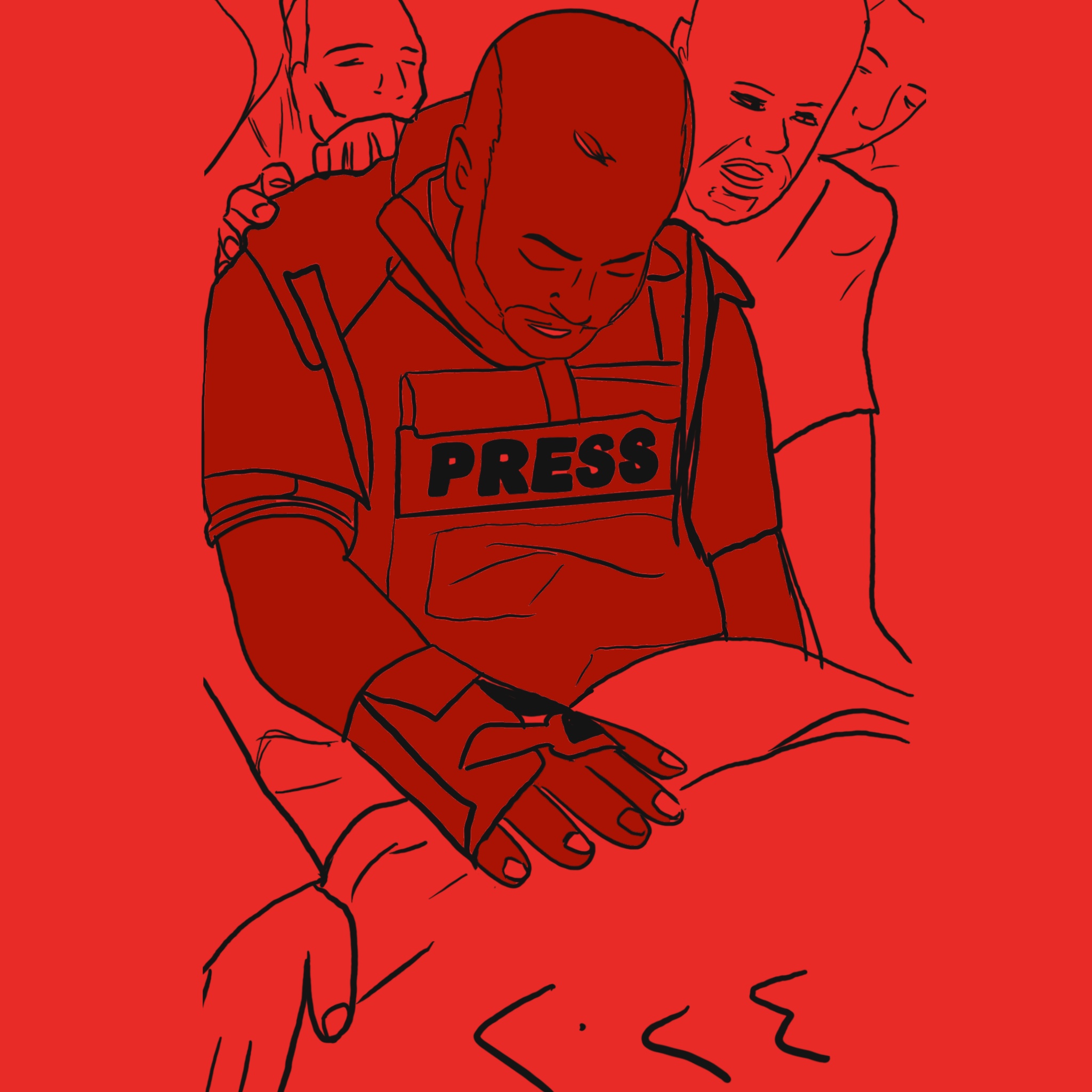
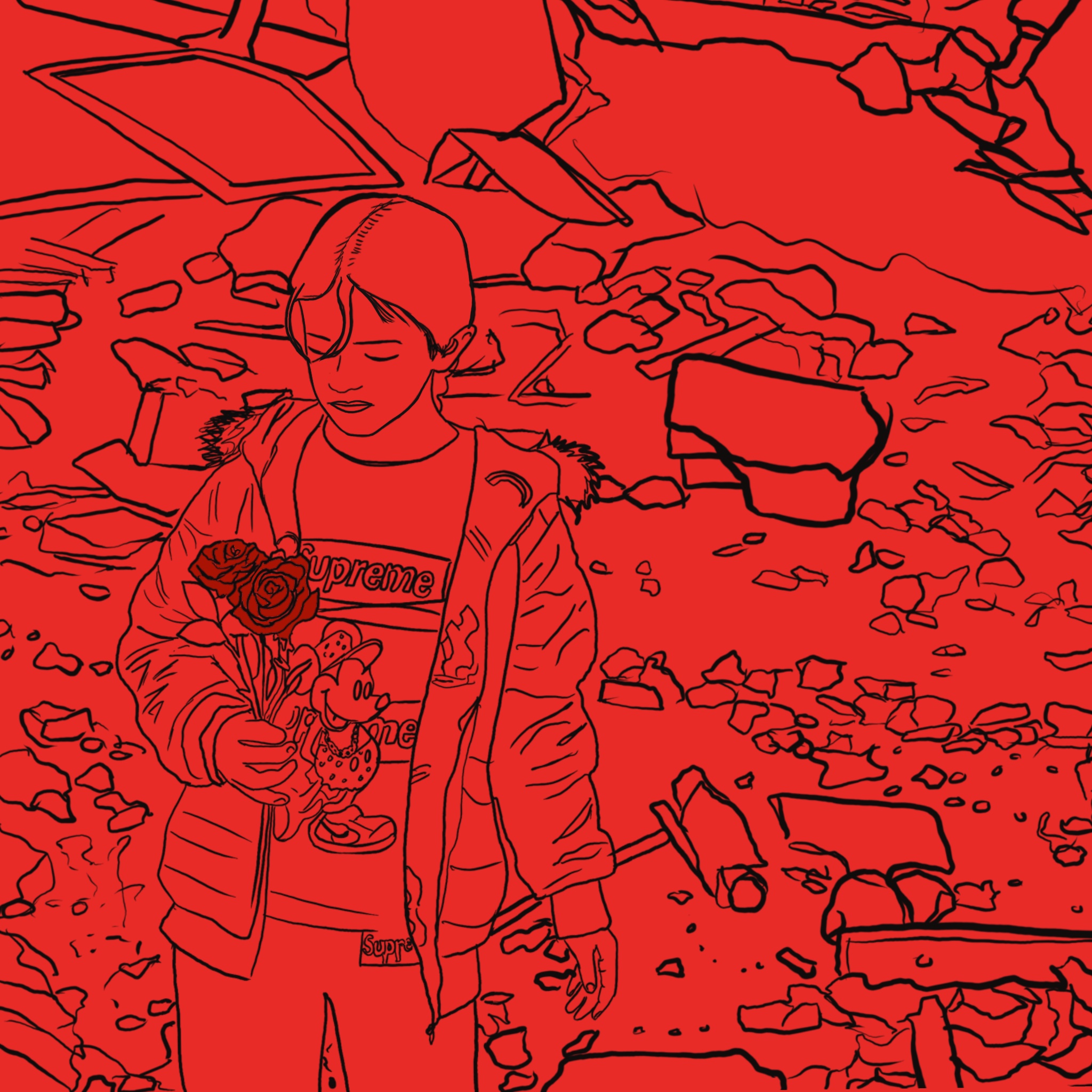
Artwork by Nada Alzalloum
Then Azzam found a Palestinian gallery owner, Kamal Moon, who would host the show and not take any commissions for art sales so all proceeds could go to Gaza.
Azzam was also concerned about news reports that aid to Gaza has been held up at the border. “What if we raise money and can’t get anything into Gaza?”
As Amin and Azzam talked about it, they decided they would make sure it went to an organization on the ground in Gaza. If they couldn’t get it in, they could wait until it is allowed.
“People in Gaza want to rebuild and they will be rebuilding for a long time,” Azzam said.
